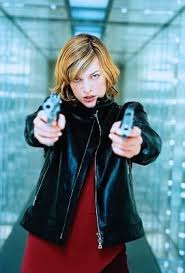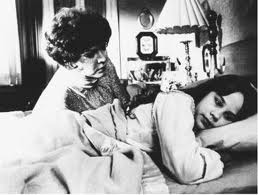Finding feminist ideology in the horror film genre can feel like searching for meaning in a Pauly Shore film. It can seem a futile effort considering the most popular horror tropes are particularly unflattering toward the female characters: the final virginal survivor, “ugly duckling” killer, the commonality of sexual assault as plot device, etc. Then there are the endless debates about whether a film passes the Bechdel test if the conversation between two named female characters centers around the killer who might be a man. But feminists like horror films, too! And some of the men and women who create them like feminism. The WWAC staff sat around our virtual campfire to discuss our favorite feminist leaning horror flicks.
Trigger Warning: Discussions of murder, sexual assault, and other gruesome acts depicted in horror films are discussed.
 Megan B: Having more than two women in a horror film that aren’t flimsy archetypes is a good place to start! The Descent (2006) is a more recent horror film that centers around a group of women who go spelunking in rural North Carolina. Not only does it feature several complex, athletic women, it is in my top ten scariest horror films for its claustrophobic setting. Sadly, some of the dramatic tension later in the film centers around the revelation of an affair, but I still appreciated the fact that the movie gives center stage to the complex friendships between adult women.
Megan B: Having more than two women in a horror film that aren’t flimsy archetypes is a good place to start! The Descent (2006) is a more recent horror film that centers around a group of women who go spelunking in rural North Carolina. Not only does it feature several complex, athletic women, it is in my top ten scariest horror films for its claustrophobic setting. Sadly, some of the dramatic tension later in the film centers around the revelation of an affair, but I still appreciated the fact that the movie gives center stage to the complex friendships between adult women.
Sarah: Ooooh – The Descent! Such an amazing horror film, and looky there, it’s ALL WOMEN. BRB. Gonna go rewatch it again. Also, Descent 2.
Jamie: Does Alice from Resident Evil count as feminist horror?
Desiree: I would definitely call Alice a power fantasy for women; she’s basically the zombie/horror version of Superman. She even had an army of clones at one point. Even without her powers, she has a strong dedication to saving the world and personal problems she has to deal with. The only negative I see is sometimes Alice is led more by the plot rather than the one driving it, especially in Afterlife and Retribution. I liked how in Resident Evil and Extinction, we saw Alice regaining her agency from Umbrella who consistently has tried to control her. Quality wise, and just as a fan of the video games, these films are downright atrocious, but there’s something to be said for the fact that one of the biggest horror movie franchises has been helmed not by just one woman, but with many strong supporting female characters as well. Claire Redfield, Jill Valentine, Ada Wong, Rain Ocampo even little K-mart/Dahlia have all played important parts in the series as a whole. There have been male characters in the series, but they’ve played much smaller roles compared to the various female characters in the movies.
 Jamie: Alice, Rain, and the other women of Raccoon City are what drew me to the Resident Evil series. The guys took the back seat more often than not except for Oded Fehr’s character Carlos, and I don’t object to his presence either; he’s female gaze eye-candy, and his character respects women.
Jamie: Alice, Rain, and the other women of Raccoon City are what drew me to the Resident Evil series. The guys took the back seat more often than not except for Oded Fehr’s character Carlos, and I don’t object to his presence either; he’s female gaze eye-candy, and his character respects women.
Megan B: I think it’s safe to say that I don’t mind Oded Fehr as eye-candy in any context.
Desiree: I’m a huge fan of the horror genre, especially slasher flicks, but I hesitate to label the genre feminist since the women in most of the movies are being stalked and many times both emotionally and physically tortured. Nowadays the “final girl” cliche is really just an excuse to watch a woman being chased around by maniacs while the grotesque antagonist kills all her friends and/or family. I began noticing this upon watching the Wrong Turn movies in sequence. Where the first one (starring the lovely Eliza Dushku) follows a young woman and her companion battling deformed forest hillbillies and saving herself and her companion; the sequels show women that do not get to save themselves or others and are instead forced to endure more trauma at the hands of the antagonists and/or are killed.
Jamie: Much as I hated it, the first Wrong Turn movie was feminist. Eliza Dushku played the most sensible person in an otherwise forgettable movie full of horror cliches.
Desiree: I know horror movies are trying to pull themselves out of the rut of cliche, but I find this trend extremely troubling since it is typically always women who inhabit the lead roles as victims. I’m always on the look out for horror movies that challenge the conventions of horror, and You’re Next does a rather brilliant job of subverting the “helpless girl being hunted” cliche and turning it into an empowering movie for women in horror. It isn’t especially scary, but I thoroughly enjoyed how it took a genre that has become over-saturated in torturing and killing women by giving the female lead their power back.
Indigo: In the last few years, I’ve seen the remake of Valentine’s Day, the one with one of the boys from Supernatural, which probably had a woman in it, but was the most unremarkable yawnfest of a gimmicky 3D movie I’ve ever seen, and that’s saying something. I also saw the remake of Friday the 13th, which starred the other boy from Supernatural. I remember vaguely that there was more sex than in the one from the 80’s, no surprise. But that one wasn’t any more memorable. Then there’s the Final Destination movies. No boogedy boogedy monsters, though. Just Death as a sentient entity in service of the natural order. There have been a few women in those who have had to out-think the hostilities of the universe itself. It’s nice in this case to see people having to use their noggins to survive, rather than hiding and running from your stock slasher.
Catie: I rather like the dangerous ladies of the genre. I think there’s also something to be said about characters who are The Mother in Horror movies. Many of the famous baddies are mothers: Carrie’s mom in Carrie, Norma Bates in Psycho, and Mrs. Voorhees in the original Friday the 13th. I wouldn’t call these representations anti-feminist, because they’re all rather delicious, over-the-top villains. Who can’t love Mrs. Voorhees murdering youths while wearing a sensible sweater?

But there are also mothers in horror who will, quite literally, go through hell for their children. One of my favorites is Chris McNeil from The Exorcist who is trying to save her daughter from something she doesn’t understand or even believe in. Chris is an accomplished career woman, a single mother in the 80s, and she is so damned determined to fight everyone and anyone to get Regan the help she needs. I also find it interesting that the two male dominated institutions early in the film, first medicine and then the Church, don’t and perhaps can’t truly understand what she’s going through. You really get the sense of how isolated and helpless she is. I don’t think that fear makes her any less feminist either. What’s scary about The Exorcist isn’t that you might get possessed, it’s that someone you love will, and you’ll be unable to save them. Another character in that mold is Lynn Sear in The Sixth Sense. This is another single mother struggling with caring for a child suffering from an unknown cause. She’s vociferously defensive of Cole and tries to protect him from both bullying children and spirits she can’t even sense. Ultimately her role is more passive than Chris’ in The Exorcist, but that moment of connection Lynn and Cole have towards the end of the film is way more touching and sweet than a horror film has any right to be.
The ultimate mother in horror has to be, I think, Rosemary from Rosemary’s Baby. Talk about a movie with feminist themes (even if it was made by the human trashbag that is Roman Polanski). The way Guy isolates Rosemary from her other friends and loved ones, demeans her then tries to make up for it, and dismisses all her concerns and feelings as irrational are huge red flags for intimate partner violence. Step aside Satan, her abuse from Guy and the lack of agency she has as soon as she becomes pregnant are the scariest parts of this story. I still get horrified shivers every time the doctor turns her back over to Guy. Look at how men further the Satanic patriarchy!
Megan B: Catie, those are some fantastic examples. I think another trend amongst the films you mentioned is that they are regarded highly by film aficionados and transcend the horror genre. Many horror films that are considered classics are noteworthy because of their compelling female leads. Writing complex women automatically makes any film better, but especially in horror where complex characters in general are secondary to the scares.

You guys have read Carol J Clover’s “Men Women and Chainsaws”, right? If anyone’s looking for and overview of gender and horror, that’s the place to start.
I haven’t but I’m putting it on my to-read list!